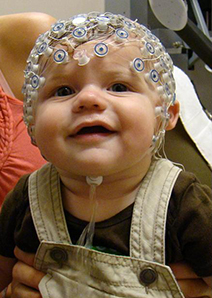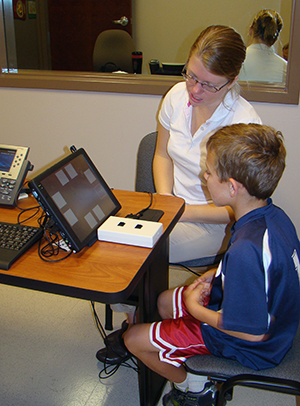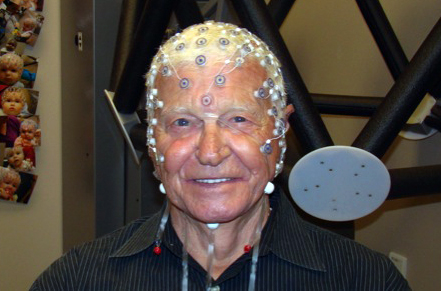 The research in Dr. Carol L. Cheatham’s Nutrition and Cognition lab focuses on effects of nutrition on brain development and function throughout the lifespan. In her work, she is exploring the importance of certain nutrients and foods to the development, maintenance, and lifelong integrity of the hippocampus and frontal brain areas. Nutrition is integral to fetal and infant brain development, which sets the stage for lifelong learning. At the other end of the spectrum, it is beginning to be evident that nutrition is also important in senescence in that certain nutrients coupled with other healthy lifestyle choices can slow the progression of age-related cognitive decline. Dr. Cheatham has active studies in four age groups; some of that work is summarized here.
The research in Dr. Carol L. Cheatham’s Nutrition and Cognition lab focuses on effects of nutrition on brain development and function throughout the lifespan. In her work, she is exploring the importance of certain nutrients and foods to the development, maintenance, and lifelong integrity of the hippocampus and frontal brain areas. Nutrition is integral to fetal and infant brain development, which sets the stage for lifelong learning. At the other end of the spectrum, it is beginning to be evident that nutrition is also important in senescence in that certain nutrients coupled with other healthy lifestyle choices can slow the progression of age-related cognitive decline. Dr. Cheatham has active studies in four age groups; some of that work is summarized here.
 During the fetal and neonate stages, humans depend on maternal transfer of fatty acids across the placenta and into milk for optimal development. In recent work, Dr. Cheatham and her research team established that a mother’s genotype was related to her infant’s cognitive performance at 6 months of age. The study consisted of two visits: saliva (for DNA) and milk sample collection at 3 months of age and a recognition memory assessment at 6 months of age. Genotyping was done for a specific location (single nucleotide polymorphism or SNP) on one of the genes (FADS2) that produces the rate-limiting enzyme in fatty acid metabolism, which is basically the ability to use the fatty acids found in plants (e.g., alpha-linolenic acid or LNA) to make the fatty acids found in animals (e.g., docosahexaenoic acid or DHA). At 6 months, the infants participated in an electrophysiology task (event-related potentials or ERP) in which they viewed a picture with which they were familiar and pictures that they were seeing for the first time (novel). Infants of the mothers who were GG were not able to tell the difference between the familiar and novel pictures. Infants of CC and CG mothers did differentiate between them. People with a GG genotype are thought to not produce enzymes sufficient to complete the conversion from LNA to DHA. As a consequence, the baby of a GG mom may not be getting enough DHA and that could be reflected in recognition memory abilities. Indeed, the GG mothers were producing milk that had lower levels of key fatty acids, including DHA. Importantly, this relation was independent of infant genotype. This study and others in the lab suggest that mothers who are GG should eat foods with plenty of preformed DHA (i.e., animal products), whereas others could eat the plant foods and still have sufficient DHA.
During the fetal and neonate stages, humans depend on maternal transfer of fatty acids across the placenta and into milk for optimal development. In recent work, Dr. Cheatham and her research team established that a mother’s genotype was related to her infant’s cognitive performance at 6 months of age. The study consisted of two visits: saliva (for DNA) and milk sample collection at 3 months of age and a recognition memory assessment at 6 months of age. Genotyping was done for a specific location (single nucleotide polymorphism or SNP) on one of the genes (FADS2) that produces the rate-limiting enzyme in fatty acid metabolism, which is basically the ability to use the fatty acids found in plants (e.g., alpha-linolenic acid or LNA) to make the fatty acids found in animals (e.g., docosahexaenoic acid or DHA). At 6 months, the infants participated in an electrophysiology task (event-related potentials or ERP) in which they viewed a picture with which they were familiar and pictures that they were seeing for the first time (novel). Infants of the mothers who were GG were not able to tell the difference between the familiar and novel pictures. Infants of CC and CG mothers did differentiate between them. People with a GG genotype are thought to not produce enzymes sufficient to complete the conversion from LNA to DHA. As a consequence, the baby of a GG mom may not be getting enough DHA and that could be reflected in recognition memory abilities. Indeed, the GG mothers were producing milk that had lower levels of key fatty acids, including DHA. Importantly, this relation was independent of infant genotype. This study and others in the lab suggest that mothers who are GG should eat foods with plenty of preformed DHA (i.e., animal products), whereas others could eat the plant foods and still have sufficient DHA.
 In the context of a larger study of LNA supplementation in toddlers, the members of the Cheatham lab, in collaboration with the members of the Niculescu epigenetics lab, found that maternal genotype and maternal DNA methylation (epigenome) at the same rate-limiting FADS2 SNP also predicted cognitive performance in 16-month-olds. Toddlers of mothers who were homozygous for the G allele (GG) performed worse on tests of declarative memory relative to toddlers of mothers who were heterozygous (CG) and homozygous for the C allele (CC). Interestingly, toddler DNA methylation status on the FADS2 promoter was related to immediate declarative (i.e., hippocampal) memory performance, and maternal DNA methylation status on the FADS2 promoter was related to delayed declarative memory performance. Thus, as the postnatal environment becomes more primary, toddlers’ own biology begins to have an effect. It was surprising that mothers’ genome has such a long-lasting, dominant influence.
In the context of a larger study of LNA supplementation in toddlers, the members of the Cheatham lab, in collaboration with the members of the Niculescu epigenetics lab, found that maternal genotype and maternal DNA methylation (epigenome) at the same rate-limiting FADS2 SNP also predicted cognitive performance in 16-month-olds. Toddlers of mothers who were homozygous for the G allele (GG) performed worse on tests of declarative memory relative to toddlers of mothers who were heterozygous (CG) and homozygous for the C allele (CC). Interestingly, toddler DNA methylation status on the FADS2 promoter was related to immediate declarative (i.e., hippocampal) memory performance, and maternal DNA methylation status on the FADS2 promoter was related to delayed declarative memory performance. Thus, as the postnatal environment becomes more primary, toddlers’ own biology begins to have an effect. It was surprising that mothers’ genome has such a long-lasting, dominant influence.
 The importance of fatty acids is not simply how much or how little omega-3 fatty acids (e.g, LNA, DHA) someone consumes, but more the relationship and ratio of omega-6 (fatty acids that are important for growth) to omega-3. In a study of 7- to 9-year-olds, Dr. Cheatham and her team showed that how much omega-3 fatty acids one ate and the omega-6 to omega-3 ratio were related to executive function abilities. When children had high ratios, a higher intake of omega-3 was related to better performance relative to those with lower omega-3 intake. When the children had low ratios, a lower intake of omega-3 and omega-6 predicted better performance than when the intakes were higher. In a follow-up study, members of the lab developed and validated a fun, new way to assess executive functions in children. The new task is an electronic maze: a mat with 48 squares through which a “safe” path is marked. The participant steps through the maze to determine the safe path being guided by unsafe squares that beep and using planning, working memory, and inhibitory control. This maze task can be altered in many unique ways to reduce or increase the cognitive load.
The importance of fatty acids is not simply how much or how little omega-3 fatty acids (e.g, LNA, DHA) someone consumes, but more the relationship and ratio of omega-6 (fatty acids that are important for growth) to omega-3. In a study of 7- to 9-year-olds, Dr. Cheatham and her team showed that how much omega-3 fatty acids one ate and the omega-6 to omega-3 ratio were related to executive function abilities. When children had high ratios, a higher intake of omega-3 was related to better performance relative to those with lower omega-3 intake. When the children had low ratios, a lower intake of omega-3 and omega-6 predicted better performance than when the intakes were higher. In a follow-up study, members of the lab developed and validated a fun, new way to assess executive functions in children. The new task is an electronic maze: a mat with 48 squares through which a “safe” path is marked. The participant steps through the maze to determine the safe path being guided by unsafe squares that beep and using planning, working memory, and inhibitory control. This maze task can be altered in many unique ways to reduce or increase the cognitive load.
Currently, one in eight Americans age 65 and older suffer from Alzheimer’s disease. As the aged population in the USA increases, the cognitive issues associated with age are becoming a public health issue. Dr. Cheatham and members of her lab recently completed a large clinical trial to explore the effects of daily blueberry intake in older adults on mild cognitive impairment (MCI). In this study titled “Blueberries: Exciting Research Relevant to You (BERRY)”, they enrolled 65- to 79-year-olds. Participants were screened and if qualified, were enrolled in either the intervention group (MCI) or the reference group (no MCI). Within the intervention group, participants were randomly selected to consume 35g of freeze-dried blueberries (equivalent to two cups of fresh blueberries) or a placebo with their normal diet each day for six months. During the 6-month period, all participants were brought into the lab nine times to assess their mental and physical status through a variety of tests and questionnaires.  The main outcomes were performance on the Montreal Cognitive Assessment (MoCA), performance on a battery of tests on the Cambridge Neuropsychological Test Automated Battery (CANTAB), and results from a set ERP paradigms. Data analyses have just begun. In analyses of the change in standardized assessment scores across the 6-month period, it appears that blueberry consumption improved the cognitive scores of the men, but not the women on the Montreal Cognitive Assessment. On the standardized tests of executive function, there is a clear effect of blueberries on processing speed. Processing speed improved in the blueberry group by 60 ms, which to the brain is a great deal of time.
The main outcomes were performance on the Montreal Cognitive Assessment (MoCA), performance on a battery of tests on the Cambridge Neuropsychological Test Automated Battery (CANTAB), and results from a set ERP paradigms. Data analyses have just begun. In analyses of the change in standardized assessment scores across the 6-month period, it appears that blueberry consumption improved the cognitive scores of the men, but not the women on the Montreal Cognitive Assessment. On the standardized tests of executive function, there is a clear effect of blueberries on processing speed. Processing speed improved in the blueberry group by 60 ms, which to the brain is a great deal of time.
In a follow-up to study the progression of MCI to dementia, this cohort is returning to the lab for one visit where they are being tested again with the MoCA, the CANTAB, and ERP. Dr. Cheatham is exploring the idea that ERP may prove important in the detection of MCI and its status as progressing or stable. With these data, Dr. Cheatham will be able to compare ERP waveforms from baseline (either 1, 2, or 3 years previous) to the follow-up data and relate it to whether or not the participant has decreased cognitive abilities based on the other scores.

Dr. Carol Cheatham is an Associate Professor in Developmental Psychology. For more information or to read about other studies and activities in the Cheatham Cognition & Nutrition Laboratory, please visit the Cheatham Lab online or follow us on Facebook and Twitter. Find more information online about the UNC-CH Nutrition Research Institute and the North Carolina Research Campus.

